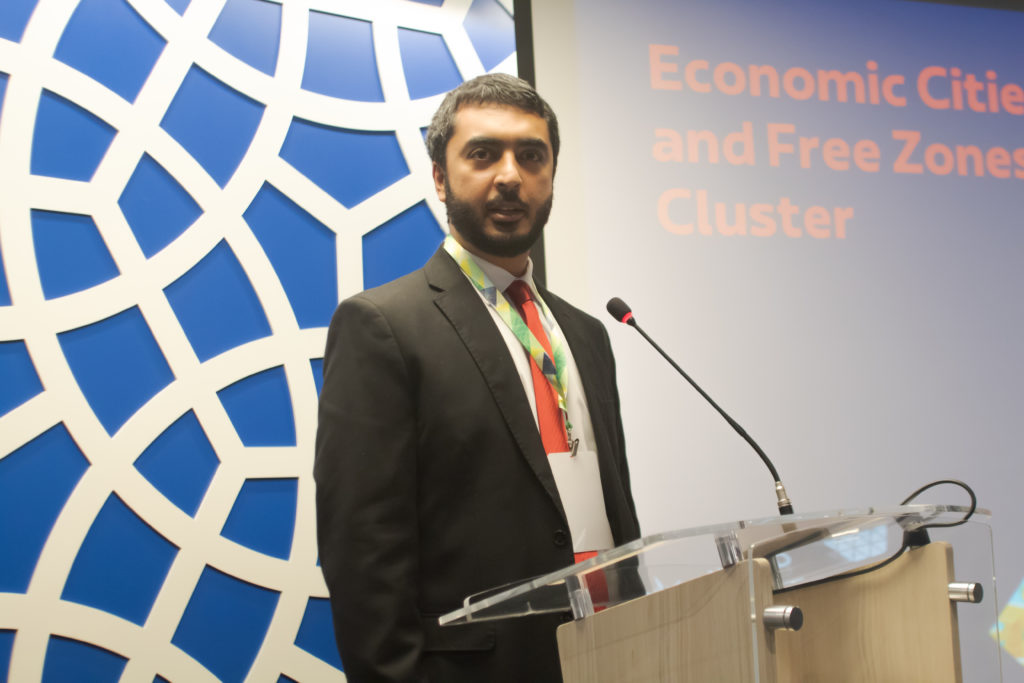São Paulo – Khalifa Industrial Zone Abu Dhabi (KIZAD), a free trade zone in Abu Dhabi, the capital city of the United Arab Emirates, has been growing as a global hub for Brazilian companies. KIZAD offers packages for installing foreign companies, including help with local registration and contacts for doing business.
The corporation managed to attract over 20 Brazilian companies in the last two years, and this week is on a mission to Brazil in search of new interested parties. In a seminar at the Arab Brazilian Chamber of Commerce (ABCC) this Tuesday (8), the commercial director of KIZAD, Khalid Al Marzooqi (pictured above), said at the end of 2019, KIZAD had only one company from Brazil installed, animal protein BRF.

At the time, KIZAD started to promote events in Brazil and Marzooqi highlighted the support of the ABCC and General Consulate of the UAE in São Paulo to reach the Brazilian private sector. In an interview with ANBA, the executive mentioned the Brazilian companies at KIZAD include the food, construction, and logistics sectors.
He said these companies have grown and expanded in the region’s market since they set up at KIZAD. Marzooqi believes the most significant advantage of the facilities for Brazilians is the ease of connection and access to the regional markets, given Brazil is located far from the UAE. KIZAD is a noteworthy manufacturing, trade, and logistics facility and serves as a business hub for international companies throughout the Middle East and North Africa (MENA).
The seminar at the ABCC brought together Brazilian businesspeople. It was the central appointment of the delegation’s schedule in Brazil, which includes other activities, mainly B2B, in the states of São Paulo and Minas Gerais until next Friday (11). At the event in São Paulo, Marzooqi gave an overview of everything the UAE, Abu Dhabi, and KIZAD offer regarding company facilities.
Among the benefits of KIZAD as a free trade zone is a possibility for foreigners to have full ownership over businesses, the absence of corporate income tax, customs fees on imports and exports for producing companies, or restrictions on the repatriation of funds and profits, among other advantages.

In his presentation at the ABCC, Marzooqi said there are support programs for enterprises of all profiles, small, medium, and large; each case is studied separately, and companies can choose the most appropriate benefits for their type of business.
KIZAD has industrial clusters aimed at multiple segments. One of them is specialized in food, a sector in which Brazil is an important global supplier. “There are customized food production and storage facilities,” said the commercial director.
KIZAD has an area of 550 square kilometers and 1,500 companies installed. It features easy access to ports, including terminals for different cargo profiles and airports. The free zone has a network of partners to take goods to other countries in the region. The possibilities of connection via KIZAD for the installed companies range from raw inputs to final customers.

“We can tailor the facilities; if a company needs a small desk, an office, a factory, a refrigerated chamber, we already have it all in the structure of our zone, and if we do not have it, we will build it for them. But I can assure you most of this is ready, regardless of business size,” said Marzooqi.
The representative for the Brazilian Market of KIZAD, Eduardo Nicolas Kezh, advised those present to look at the business potential existing in the UAE. “I would like to see more Brazilian companies in the UAE. The time is right; dare, register your business in the UAE,” he said, emphasizing they will have support from the government and the Emiratis.
Brazil and the UAE; partners
The seminar was opened by the president of the ABCC, Osmar Chohfi, who highlighted the profile of the UAE as a hub for connecting to the entire Arab world. He also spoke on the role KIZAD plays in importing and exporting goods, the basis of foreign trade with the Arabs.

Chohfi presented Brazil’s significant trade figures with the Arab countries last year, with exports of USD 14.5 billion, 26% growth over the previous year, and imports of almost USD 10 billion, an 83% expansion compared to 2020.
The consul general of the UAE to São Paulo, Ibrahim Salem Alalawi, and the secretary-general of the ABCC, Tamer Mansour, spoke to those present about the economic strength of the UAE. Mansour said the Arab country was an example to the world facing the COVID-19 pandemic, both through vaccination and economic recovery and how it hosted Expo 2020 Dubai.
Alalawi said his country had developed a sustainable economy based on non-oil sectors, and the UAE is looking towards the future. He mentioned among the latest events in this subject Expo 2020 Dubai and the Museum of the Future opening. “We are not just waiting for the future; we are designing it with our hands,” said the consul general, stressing this is the UAE’s national government’s strategy.
The diplomat spoke on the free trade agreement recently signed between the UAE and India and said it is an example of the UAE’s open and sustainable relationship with global partners. Alalawi stated Brazil and the UAE have solid economic and political ties, which has helped companies and organizations open branches in both countries. The ABCC is an example of a Brazilian institution with an office in Dubai, in the UAE.
Translated by Elúsio Brasileiro




